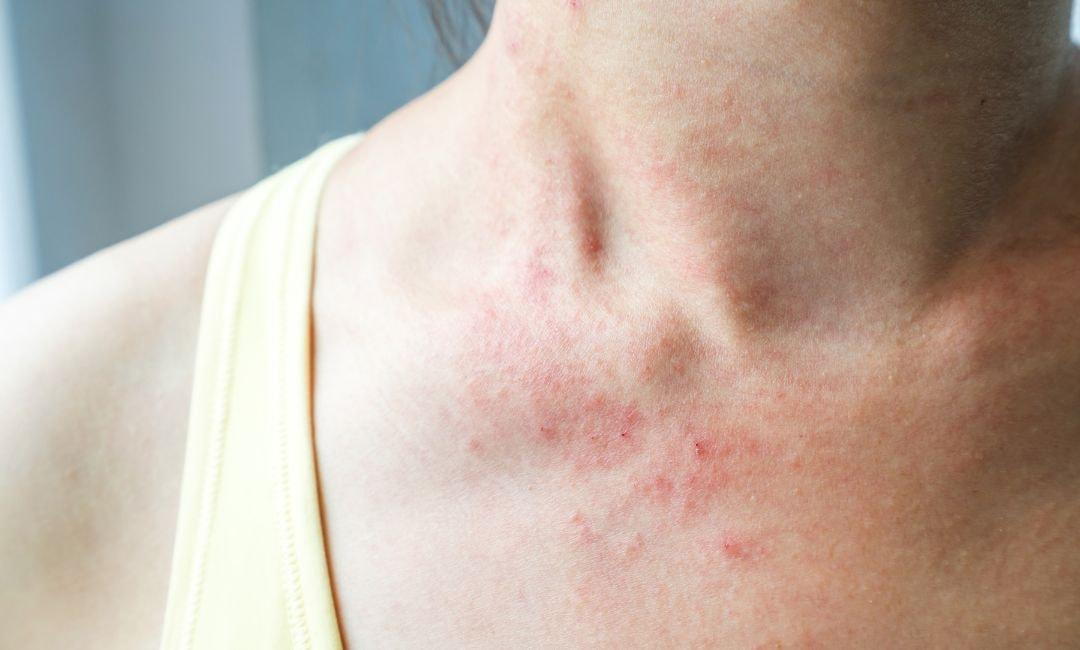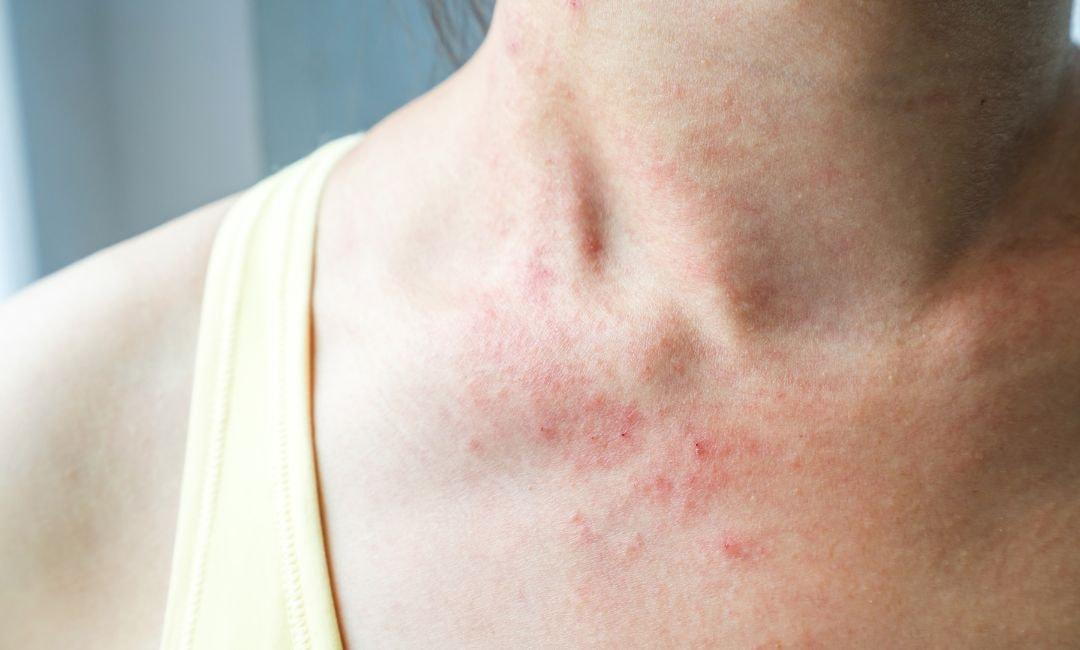Is Eczema Contagious?

- posted: Sep. 12, 2024
You've seen those red, itchy patches on someone's skin, and you can't help but wonder: is it contagious? Can I catch it just by touching them? Eczema, though a common skin condition, is often misunderstood. So, let's cut through the confusion and get to the heart of the matter.
In this post, we'll tackle the following:
The straight answer: Can eczema be passed from person to person?
Why it looks contagious: Understanding the typical eczema symptoms that might cause confusion
Triggers to watch out for: Factors that can worsen eczema, even if it's not contagious
Protecting yourself: Simple steps to avoid skin irritations
If you've been scratching your head (and maybe your skin) over this question, stick around. We've got the answers you need.
And hey, if you're in the Fort Lauderdale area and dealing with eczema or any other skin diseases, the experts at Natura Dermatology & Cosmetics are here to help. With a focus on compassionate care and cutting-edge treatments, they'll have you feeling confident in your skin again.
Can Eczema Spread Like Wildfire? Nope.

Let's get this straight right off the bat: eczema is not contagious. You can't "catch" it from someone else, even if their skin is looking particularly angry. It's not like a cold or the flu that jumps from one person to the next. So, breathe easy – you're not going to get eczema from hugging your friend, sharing a towel, or even holding hands.
Think of it this way: eczema is more like a solo performance, not a group dance. It's a personal reaction happening within your skin, not something that can hop onto someone else's.
But wait, if it's not contagious, then why does it sometimes look like it's spreading? We'll get to that in a bit. But for now, just remember: eczema is a solo act, not a contagious chorus.
Why Does it Look Like Eczema's Spreading?
So we know eczema isn't like a game of tag – you can't pass it on to someone else. But why does it sometimes look like it's spreading across your own skin? There are a few sneaky culprits behind this illusion:
The Itch-Scratch Cycle: When eczema flares up, it itches like crazy. You scratch, it gets irritated, and then it itches even more. This cycle can make the affected area seem to expand. It's not the eczema itself spreading, but rather the inflammation getting worse.
Dry Skin Woes: Eczema-prone skin tends to be dry and easily irritated. When it's not properly moisturized, it can become flaky and cracked, making the eczema look more widespread.
Trigger Happy: Certain things can trigger eczema flare-ups, like harsh soaps, allergens, or even stress. If you come into contact with a trigger, it can cause new patches to appear, giving the impression that the eczema is spreading.
So, it's not that the eczema is actually contagious or jumping from one spot to another. It's more like a series of unfortunate events that make it seem that way.
Pro Tip: If you're noticing new scaly patches or your eczema seems to be spreading, take a closer look at your recent activities and environment. Could there be a trigger lurking about? Keeping a journal can be a helpful way to track potential triggers and flare-ups.
Eczema Triggers: The Usual Suspects
While eczema isn't contagious, certain things can make it flare up and act up. Let's run through a few of the most common triggers:
Irritants: Think harsh soaps, detergents, fragrances, and even certain fabrics. These can disrupt your skin's natural barrier, leading to dryness, itching, and inflammation.
Allergens: Pollen, dust mites, pet dander – these allergens can set off an immune response in your body, triggering an eczema flare-up.
Stress: We all know stress isn't good for us, and your skin is no exception. High-stress levels can weaken your immune system and make you more susceptible to eczema flare-ups.
Weather: Dry air, extreme temperatures, and even sweat can all irritate eczema-prone skin.
Food Allergies: While less common, certain foods can trigger eczema in some people.
Identifying your personal triggers is key to managing your eczema. Keep a journal, pay attention to your surroundings, and don't be afraid to experiment with different products and routines to find what works best for you.
Pro Tip: If you're struggling to pinpoint your triggers, consider seeing a dermatologist. They can help you identify potential allergens and irritants and develop a personalized treatment plan.
At Natura Dermatology & Cosmetics, we specialize in helping patients manage their eczema and other bacterial skin infections. Our team of experts will work with you to identify your triggers and develop a customized treatment plan that addresses your unique needs.
Protecting Yourself
So, if eczema isn't contagious, do you need to worry about protecting yourself? Well, not from catching it, but definitely from triggering a flare-up in your own skin (if you're prone to it) or simply experiencing irritation. Here are a few simple steps you can take:
Moisturize, Moisturize, Moisturize: Keeping your scaly skin hydrated is key to maintaining a healthy skin barrier. Look for fragrance-free moisturizers that are formulated for sensitive skin. Apply them liberally throughout the day, especially after bathing or showering.
Gentle Cleansing: Say goodbye to harsh soaps and opt for gentle, fragrance-free cleansers. Avoid scrubbing too hard, as this can irritate your skin.
Avoid Triggers: If you know certain things trigger your eczema, steer clear of them. This might mean switching laundry detergents, avoiding certain fabrics, or even managing stress levels.
Protect Your Hands: Wear gloves when doing dishes or using harsh cleaning products. This will help protect your skin from irritants.
Contact Dermatitis: If you're struggling with eczema, don't hesitate to reach out to a dermatologist. They can help you develop a personalized treatment plan to manage your skin symptoms of eczema and prevent flare-ups.
A healthy skin barrier is your best defense against irritation and flare-ups. By taking these simple steps, you can help keep your skin happy and healthy.
Natura Dermatology & Cosmetics recommends a range of gentle skincare treatments and products formulated specifically for sensitive skin. Our experts can help you choose the right products for your needs and develop a skincare routine that supports your skin's health.
FAQs
Does eczema spread if you scratch it?
Technically, no. Atopic eczema itself doesn't spread through scratching. But... scratching can make things worse. It can lead to:
Broken skin, which can become infected.
More inflammation and itchy skin, creating a vicious cycle.
The appearance of spreading, as the affected area gets larger.
If I have Eczema, will my child have eczema?
There's a genetic link. If you or your partner have eczema, asthma, or allergies, your child has a higher risk. But it's not guaranteed. Many factors play a role, including environmental triggers.
What is the root cause of Eczema?
The exact cause is a bit of a mystery, but here's what we know:
It's linked to a weakened skin barrier, which lets moisture out and irritants in.
Genetics play a role, as does an overactive immune system.
Triggers vary from person to person, but can include:
Stress
Certain foods
Irritants (soaps, detergents, etc.)
Allergens (pollen, dust mites, etc.)
Weather changes
Sweat
Does eczema ever go away?
It can. Many children outgrow it, and even adults can experience long periods of remission. But it's often a chronic condition, meaning it can come and go throughout your life. The good news is, with proper management and treatment, you can keep flare-ups to a minimum and live comfortably.
Need a Helping Hand with Your Skin?
Eczema might look a little scary sometimes, but it's not something you can catch. It's all about understanding your triggers, keeping your skin hydrated, and seeking help from a dermatologist if needed. With the right knowledge and care, you can keep those flare-ups at bay and live comfortably with atopic dermatitis.
Key takeaways
Eczema is NOT contagious.
Scratching doesn't spread eczema, but it can worsen it.
Triggers like stress, allergens, and irritants can cause flare-ups.
Moisturizing and avoiding triggers are key to managing eczema.
At Natura Dermatology & Cosmetics, we get it. Eczema can be frustrating, but you don't have to face it alone. Our team of experts is here to guide you every step of the way, from identifying your triggers to developing atopic dermatitis treatment plan. We'll help you achieve the clear, comfortable skin you deserve.
Contact Us
Our Locations
Broward Location
800 E Broward Blvd, Ste 507
Fort Lauderdale, FL, USA
Hours of Operation
8:30 am - 12:00 pm
1:30 pm - 5:00 pm
8:30 am - 12:00 pm
1:30 pm - 5:00 pm
8:30 am - 12:00 pm
1:30 pm - 5:00 pm
8:30 am - 12:00 pm
1:30 pm - 5:00 pm
8:30 am - 12:00 pm
1:30 pm - 5:00 pm
Closed
Closed


